Some of the best times of my youth, growing up in Alaska, was fishing with my father. I shared, in a post about panic, how things were when I was at home. When my family and I would go fishing on the weekends, or over the Fourth of July weekend, things were completely different. Being away from home, in a motor home, or a cab-over camper, or even a tent was bliss, heaven itself.
I know that we camped more when I was little, but I think I really started paying attention to the act of camping, the seriousness of fishing, the art of the cast, the ability to not getting the line tangled in the reel, was when I was about 9 or 10. My step-mother’s parents owned some property in Soldotna, Alaska, right on the world famous Kenai River. When the salmon was running, a person couldn’t help but catch a fish.
My dad was able to decompress from the thankless work he did for the School District, my step-mom could unwind from working in the computer tape library of an airline. My brother and I could run, and build little fairy houses beneath the huge pine tree next to the river. We could play with fire! Well, kind of. We could play with fire if my parents weren’t looking. If they had been, we were told, “Boys who play with fire wet the bed.” Where that expression ever came from, I have no idea, but it was ever present in my adolescent, pre-teen life.
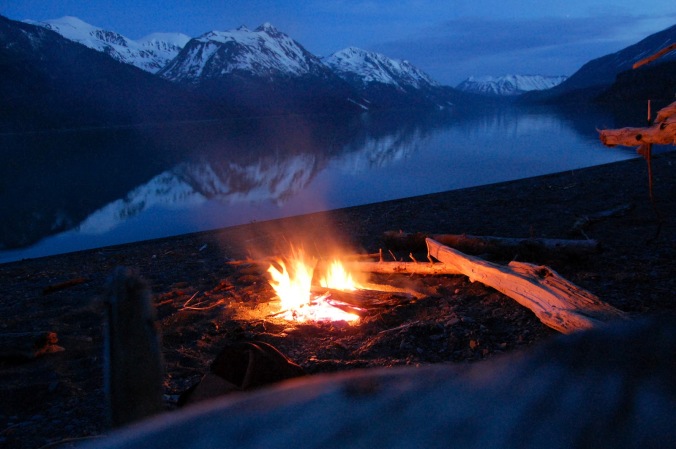
Midnight Sun in Alaska
Summers in Alaska are unlike anywhere in the Lower 48. For those who have no idea what the Lower 48 is, allow me to explain in a short sentence: It is the continental U.S. that existed on our maps in school South of Canada. We had almost constant day light. The sun would set, dip below the horizon at around 1 in the morning, stay down casting a twilight atmosphere, before popping up again at around 4 in the morning. This type of light is called “The Midnight Sun”. I had never seen 4th of July fireworks in complete darkness, except on television, when at 8 at night, the live shows from New York City would be broadcast over the air. My brother and I could stay up as late as we wanted to, with plenty of light to see everything.
I remember the first fish I had caught on my own. It was a 15 pound silver salmon. A female, which was important, because we used the eggs as bait. Catching a female meant we could continue fishing tomorrow, or next weekend. I learned how to cure the eggs, so they wouldn’t rot. I learned how to scale the fish, and even filet them. I earned my first filet knife when I was about 12. I was so proud! I was able to gut, scale, de-fin, behead and filet a salmon in about 3 minutes. I was quick and accurate. I loved it. Not because I wanted to cause pain to a living creature, but because it meant I had been successful, it meant that I was growing in independence, it meant I could provide food. (Not that I needed to, we were well off when I was a kid).
My dad was funny when we went fishing. My dad was kind and loving. He was patient. He was strong, and sure and absolutely amazing. It was when we were fishing that I got to really know my dad, and mourn that father when we’d go home for the week, and the grumpy, mean, angry father would return, until our next fishing trip.
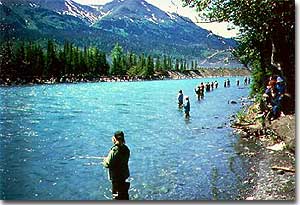
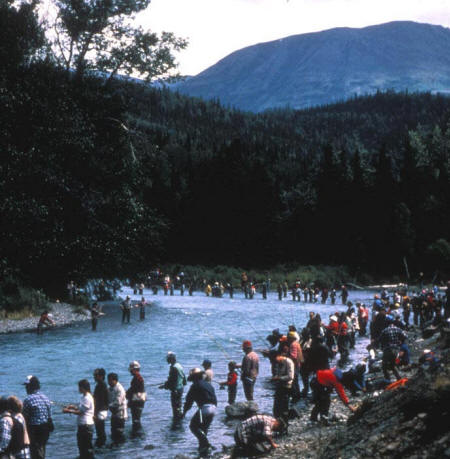
The pictures above are “Elbow-to-Elbow” fishing, or “Alaska Combat Fishing”
I remember when my step-grandfather, Grandpa Hopper, bought a flat bottom river boat. The motor was a regular outboard engine, but instead of using a propeller for propulsion, he had a water jet set up installed. This meant we could go into shallow sloughs, and get to the hiding places in which the larger fish would hide. We could also traverse the rapids and get farther upstream, to get away from all the stupid tourists that had no idea what they were doing, except cross lines and tangle with their neighbor, and cause us “real Alaskans” to lose our lures. (I hated tourists. They had no idea what it was like to live the way we “Alaskans” did. They were outsiders.) It was on the Kenai river that I learned about combat fishing, and the idiocy of staying at a lodge and fishing along 500 feet of water-front with the 300 other guests, all trying to catch a prized Silver or King Salmon.
Back to the boat: We would take that boat and leave the camp site at around 4 or 5 in the morning, run upriver for about 3 miles, cast our lines and just drift down river, well past the property, around multiple bends, away from the tourists, into the midst of “Real Alaskans”, and catch Kings and Silvers. We’d call to a passing boat, “Any luck?” If the folks had good luck, we’d be blessed with a show of 10 to 12 fish hanging from a stringer, our fellow fishermen or fisherwomen beaming proudly over their catch. If the had bad luck, we’d commiserate, and hope for better fishing farther down, away from the vultures (read tourists).
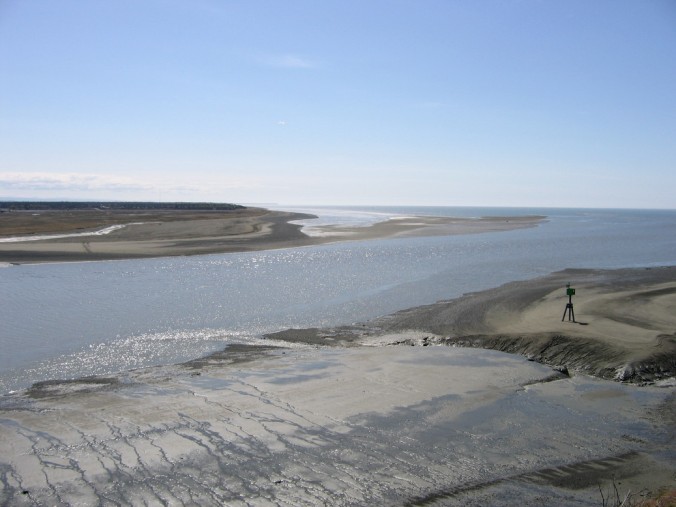
Mouth of the Kenai River
One time, my dad, grandpa, brother and I decided it would be a great idea to travel the entirety of the Kenai river, from the Lake, all the way to the mouth, where it would meet the steel colored water of the Pacific Ocean. Oh, that day will be forever burned in my mind. Nothing bad happened, we caught fish after fish. We ran out of bait, and finally, after what seemed hours of drifting, heard the crashing of the waves beating their unstoppable rhythm on the sandy shores. The weather had started to turn, and we got swept out onto the ocean, much farther than we had intended. Grandpa, with great calmness, started the engine, and turned the boat to shore. The wind was whipping up the waves, 3 foot white caps, very choppy, and dangerous. My dad, fearful of water, had paled, turning his eyes to the ever diminishing shoreline. I could see the relief in his eyes when the motor turned over. We turned away from the wind, and picked up speed. Something amazing happened then: Our little 14 foot river boat was going the same speed as the wind. There was no sound, save the engine. I could hear my brother say, “Wow, this is so cool!” I never, until that moment, realized that you could be moving in a direction and not have headwind. We were 1,000 yards from shore, in choppy seas, and I’d never had a more peaceful moment in my life. Just my dad, brother, and my Grandpa Hopper, bouncing over the chop, in windless motion, returning to the safety of the shore.
Fishing was a ritual for my family. We increased our comfort from tents, to a camper, to a motor home my dad bought on a whim. My grandparents eventually sold the property in Soldotna. The seasonal flooding of the Kenai began to be too much for them, trying in their retirement every spring to clean up after the waters receded. We started to fish out of Seward, Alaska. My father bought a boat, “The Lucy-L”, a play on the previous owner’s wife’s name, Loucille. It was a 22 foot Bel-Bouy, in-board/out-board cabin cruiser. It slept 4, had it’s own head, and mini-galley. I loved that boat. I learned how to pilot the marine highway before I knew how to drive a car. I learned the proper speed for trolling, how to weigh and set anchor, why the running lights were vital, and the white light indicating a boat at anchorage. I learned why it was vital to turn the blowers on before we started to refuel, I learned how and why the bilge pump worked. I learned how to fish in 300 feet of water, with my halibut pole, and massive reel with string for fishing line, instead of the monofilament line used for river fishing.
My dad carried a .22 revolver on the boat. He showed my brother and I where it was, and how to use it. Firearms in Alaska are as important up there as air conditioning is in the desert. A person who went into the bush without a gun was a walking dead person. The height of stupidity. Why did my father have a loaded pistol on our boat? Why, it was for the fish! I was amazed when he told us about that. Evidently, we were told, a fish called a halibut was so powerful that if we landed one before it was dead, the strength of its tail could bash a hole into the bottom of the boat, and we’d sink. I didn’t believe him at first, but, truly it could happen.
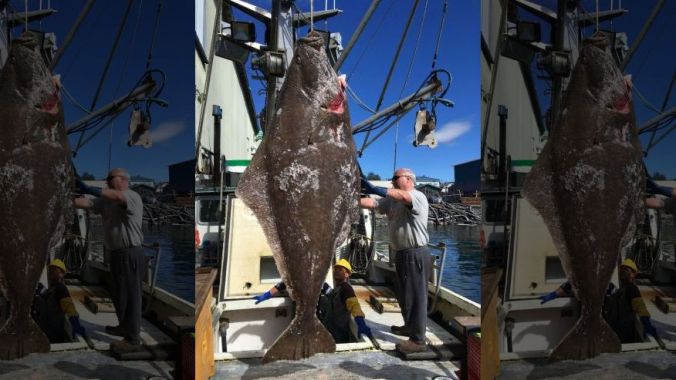
Massive Halibut, Alaska!
The first halibut I’d ever seen shot was a 120 pounder…that sucker was 5 feet long, and 6 inches thick. It was the ugliest thing I’d ever seen; flat, its skin a horrible muddy brown on one side, and milky-white on the other. Weirdest of all, both its eyes were on one side of its head. My dad shot it, then tied a rope through its gills, down the length of the body, created a loop to place over its tail, tied the rope to the cleats, then started the motor, yelling at me to pull up the anchor a few feet. Almost in a panic, he shoved the transmission lever into reverse, and slammed on the throttle. I was on the bow, and almost fell over board. I looked at him, his eyes wide, white-knuckles squeezing the steering wheel as if choking it to death. I was wondering what the hell was going on! It turns out the fish was the largest he’d seen, and being terrified of the water, decided that shooting the fish wasn’t enough, and in order to rescue us from assured sinking, the fish needed to be drowned. He finally regained composure, laughed a bit, put the boat in neutral, and told me to drop anchor. That fish, that fat, ugly halibut that almost caused our doom, oh, it tasted SO good when we grilled it at the camp site. Victory was ours over the wild and scary waters of Resurrection Bay.
Fishing. Fishing was a ritual, and I so miss fishing with my dad.
Wow! I was really interested to read this. I have always wanted to visit Alaska.
LikeLike
At the time I was a kid, I took if for granted, and wanted to escape from Alaska. Now, I wish I’d stayed! Miss it. Thanks for the comment 🙂
LikeLiked by 1 person
I hope my daughter remembers the times we went fishing in Northern Alaska like you do. Now that I have moved to the ‘lower 48’ after a decade and a half in a remote cabin all I have are memories and her Facebook page which taunts me with pictures of her catch of the day around Fairbanks. Thanks for sharing your memories.
LikeLiked by 1 person
I hope your daughter remembers her time with her dad as something special, and irreplaceable. You did something I had always wanted to to, live in a remote cabin! I still dream about it, especially when listening to the music of the city (read police and fire engine sirens going off a 2 in the morning). I’m glad you were able to do that. I thank you for taking the time to read my story, and that you appreciated it.
LikeLike